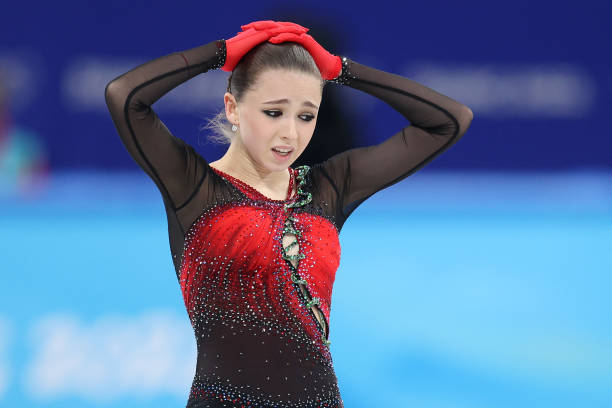The biggest controversy of the 2022 Winter Olympics occurred during the figure skating finals on Thursday, Feb. 17.
15-year-old Russian figure skater Kamila Valieva was allowed to compete in the team competition despite testing positive for a banned substance in December 2021, the latest event in Russia’s history with doping and cheating in the Olympics.
A day before the individual competition began on Feb. 15, the Court of Arbitration for Sport ruled her as blameless for the test result and cleared her for competition in the individual event. In the days following the decision, reports said Valieva’s coaches were to blame for the positive test as they forced her to take illegal substances. As support for Valieva and outrage towards her coaches poured in, the decision to allow her to compete was widely scrutinized.
Valieva, the clear favorite for the individual short program event, fell multiple times during her final run. She posted the worst score of her professional career, placing fourth. Valieva’s training partners, Anna Shcherbakova and Alexandra Trusova, took home the gold and silver medals.
Following the conclusion of the competition, head coach for Russian figure skating Etri Tutberidze was seen yelling at 15-year-old Valieva, who was clearly devastated.
Silver medalist Trusova also broke down on the ice in front of cameras. President of teh IOC Thomas Bach said seeing the skaters break down and how they were received by coaches confirmed his fears about how Russia treats their Olympic athletes.
“When I afterwards saw how she was received by her closest entourage, with such—what appeared to be a tremendous coldness—it was chilling to see this,” Bach said. “Rather than giving her comfort, rather than trying to help her, you could feel this chilling atmosphere, this distance.”
Bach also spoke on the impression the incident gave the International Olympic Committee.
“I was pondering about whether you can be really so cold, but when I saw and read today how Alexandra Trusova was being treated, I am afraid this impression I had last night was not the wrong one,” Bach said.
Russia’s history of systematic doping has resulted in 46 medals stripped from the country’s record, 29 of them from the 2008 and 2012 Olympics, and over 150 athletes caught doping or using illegal substances. Of the 389 Russian athletes submitted to the IOC for the 2016 Summer Olympics in Rio, 111 were removed because of a doping scandal. Because of this incident, the World Anti-Doping Agency banned the Russian Confederation from all major sporting events including the Olympics for four years in 2019. Russian athletes are still allowed to compete under the name of the Russian Olympic Committee. They are not allowed to wear their country’s colors or flag, neither of which are displayed in the Olympic Games.
In 2016, the International Association of Athletics Federations banned head of Russian Athletics Federation Valentin Balakhnichev and top Russian coach Aleksey Melnikov for life for their involvement in doping scandals.
The 2021 Games have yet again left a bad taste in the IOC’s mouth when it comes to Russia and their treatment of their Olympic athletes.










Be First to Comment